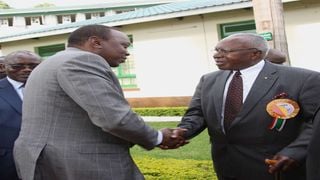
Former Cabinet Minister Simeon Nyachae (right) with President Uhuru Kenyatta. Nyachae died on February 01, 2021 at the age of 88.
| File | Nation Media GroupNews
Premium
The Nyachaes’ ties to Kenyattas and how politics has divided family
What you need to know:
- The late Nyachae had at least six known wives and over 35 children.
- His first wife, Esther Nyaboke, who died in 2016, had several daughters and two sons.
Former minister Simeon Nyachae leaves behind a political dynasty with vast business interests running into billions of shillings and dozens of children, many of them married to other well-connected families including the members of President Uhuru Kenyatta’s extended family.
The Nyachaes are among the leading investors in Kisii town while his national business interests range from various companies among them Kabansora, Sansora, Credit Bank, and NCBA Group to large scale wheat farming.
The late Nyachae had at least six known wives and over 35 children.
His first wife, Esther Nyaboke, who died in 2016, had several daughters and two sons.
His second wife Druscilla Kerubo had only one daughter, Mary. She died three months after giving birth to her.
Most known family
Nyachae’s most known family is that of his third wife Martha Mwango who was the sister to Lawrence Sagini, Kenya's first Minister for Education.
Martha is the mother of, among others, Charles Nyachae, Noah, Ndemo, Kennedy, Mike and Nyandusi, who are some of the former minister’s most known children.
His fourth wife, Sylvia, is the sister of Jane Kiano, the wife of Gikonyo Kiano, a cabinet minister throughout the Kenyatta years and the first Kenyan to earn a PhD. Sylvia has three sons.
His fifth wife, Grace Wamuyu is a scion of the Mbiyu Koinange family. Grace is the mother of businessman Lee Nyachae. Both Grace and the late Nyachae are board members of Credit Bank.
Stayed with their father
The former minister raised all his children whom he normally stayed with.
“The kids mostly stayed with their father and at times away from their mothers. He kept a file of his children’s birth and academic certificates and only gave them the documents recently when his health worsened,” a close family friend said.
When he was alive, Mr Nyachae made every effort to unite his family behind his political ambitions and political divide of his liking. But as he neared his death, his family appeared to be pulling apart.
A week before his death, Nyachae’s son Noah turned up at the opening of a church with Interior Cabinet Secretary Fred Matiang’I, who is pushing for the Building Bridges Initiative (BBI).
His other brother, Charles, has been championing for the hustlers movement allied to Deputy President William Ruto which terms the BBI a waste of taxpayers’ resources.
Alongside Kisii Deputy Governor Joash Maangi, Charles, who is a judge of the East African Court of Justice, is now among the senior most politicians from the Gusii region who are pushing for a DP Ruto presidency in 2022.
Noah and his brothers Lee and Ken have aligned themselves with Dr Matiang’i who is in the same political path with both President Uhuru Kenyatta and ODM leader Raila Odinga.
Political divide
The political divide was evident Monday when DP Ruto announced that Charles Nyachae had called him to confirm that his father had died.
A few minutes before DP Ruto announced the death during the funeral ceremony of the father of Kisii Deputy Governor Joash Maangi, Mr Odinga had told the mourners that the news of the death of the former minister was yet to be confirmed and went on to ask Kenyans to pray for the family.
Close relations
Notably, the Nyachaes kept close relations with the Kenyatta family. One of Nyachae’s sons, Kennedy, was married to a daughter of Beth Mugo, President Kenyatta’s cousin.
The relations among the two families extend to the colonial times.
Five days before he was arrested and sent to Kapenguria, Jomo Kenyatta hid at the home of colonial chief Musa Nyandusi, the father of the late Simeon Nyachae, to avoid being arrested by the British colonialists.
On October 15, 1952, Kenyatta was campaigning in Kisii for self-rule when he received a tip that the colonial administration was seeking to arrest him.
Nyandusi hid him for the night and helped him escape to Nairobi.
However, Kenyatta was arrested five days later.
The British were furious when they discovered what Nyandusi had done, but he pleaded that he was only meeting traditional African obligations of hospitality to a visitor.





